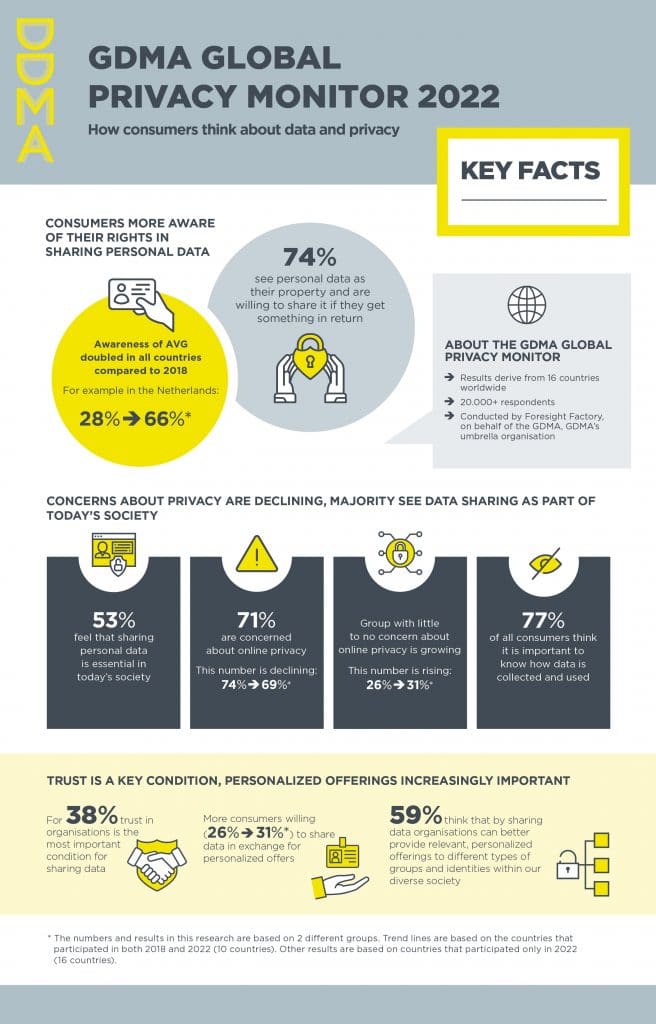Consumers more aware of their rights in sharing personal data
Since the last Global Privacy Monitor, published in 2018, awareness of the General Data Protection Regulation (GDPR) has increased significantly in Europe. In all European countries, the percentage of consumers who are familiar with the privacy law introduced in 2018 has more than doubled. In the Netherlands, awareness has increased from 28% to 66%*. Consumers are becoming more aware of their rights in controlling and sharing their personal data – and that’s good news. Additionally, 74% of people view their personal data as their own property that they can share in exchange for relevant offers or better services.
Concerns about privacy are declining, majority sees data sharing as a crucial part of today’s society
Despite the fact that concerns around online privacy are still high – globally 71% of consumers are concerned about this to a greater or lesser extent – concerns are lightly declining (from 74% to 69% among the countries participating in both 2018 and today*). The majority of consumers worldwide (53%) agree that sharing personal data is essential to today’s society. It has become normal, people now feel quite comfortable sharing their personal data. Moreover, the group that has little to no concern about online privacy and sharing personal information has grown over time, from 26% to 31%*. Transparency is a crucial prerequisite: 77% of all consumers indicate they want to know how data is collected and used.
Trust is the most important condition for sharing data, personalized offerings increasingly important
Consumer trust should be of great importance to Organisations. In fact, 38% of consumers see trust as the most important condition for sharing data. Another important reason for sharing data is personalized offerings. More and more consumers (39%, compared to 29% in 2018*) view a relevant offer tailored to their needs as an important motivation for sharing their data. The importance of personalization is also reflected in how consumers assess its contribution towards inclusivity. 59% think that by sharing data, Organisations can better provide relevant, personalized offerings to different types of groups and identities within our diverse society.
* The numbers and results in this research are based on 2 different groups. Trend lines are based on the countries that participated in both 2018 and 2022 (10 countries). Other results are based on countries that participated only in 2022 (16 countries).
About GDMA
GDMA is an Organisation that represents, supports and unites marketing associations from around the globe that focus on data-driven marketing. It promotes worldwide initiatives aimed at providing marketers with global trend information, thought leadership and know-how on data-driven marketing across all sectors, disciplines and channels. Twenty-eight marketing associations are currently part of GDMA and more countries will join as their marketing associations begin to undertake the data-driven marketing remit. Collectively, they represent a significant proportion of the world’s major brands, corporations, suppliers and agencies. Through its members’ associations, GDMA provides access to the world’s largest network of data-driven marketing organisations and influencers.
GDMA Global Privacy Monitor 2022
Download (1,19 MB)GDMA Global Data Privacy 2022 Infographic English
Download (87,73 KB)
Ook interessant

Update marketinggids Responsible AI voor de verantwoorde inzet van AI in marketing (2026)

Wat je moet doen na een cookie-waarschuwing van de AP


